|
|
|
Sort Order |
|
|
|
Items / Page
|
|
|
|
|
|
|
| Srl | Item |
| 1 |
ID:
151967
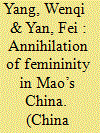

|
|
|
|
|
| Summary/Abstract |
During the Chinese Cultural Revolution, Mao’s famous political slogan ‘The times have changed, men and women are the same’ (时代不同了, 男女都一样) asserted that men and women were equal in political consciousness and physical strength. However, the slogan’s seeming emphasis on gender equality misconstrued the concepts of equality and sameness. In-depth interviews with former ‘sent-down’ youth illustrate how state rhetoric appropriated a discourse of women’s equality to silence women and depoliticize gender as a political category. For urban sent-down youth, gender inequality was absent from public discourse, and conflict between the sexes was concealed by a state discourse that constructed class struggle as paramount. Gender as a category was credited with solely political and pragmatic meaning and was utilized as a means for the communist government to achieve its own political and cultural utopia.
|
|
|
|
|
|
|
|
|
|
|
|
|
|
|
|
| 2 |
ID:
140249
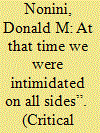

|
|
|
|
|
| Summary/Abstract |
This article proposes that the Emergency counterinsurgency campaign of the British colonial state should be viewed as a conjunctural episode of dispossession of Malayan laboring people. Conjunctural episodes of dispossession of working people through state violence and racialized rhetoric emerge as a response to crises in capitalist accumulation occurring at multiple and overlapping scales of capitalist systems – the imperial, the national/colonial, and the local/regional. During these episodes state and capitalist strategies destroy political organizations and solidarities among laboring people and demoralize them over long periods of time, through processes simultaneously material and semiotic. Employing new theorizations of the global anthropology of labor, this article first examines the postwar and Emergency years when the multiethnic and industry-wide bases of Malayan trade unions were destroyed while an estimated half a million working people were forcibly concentrated in so-called New Villages. This had the effect of suppressing a discourse of class and class struggle in favor of a dominant discourse of ethnic conflict. In an effort to articulate class struggle despite the presence of this dominant discourse of essential ethnic difference this essay examines the formation of a new working men's “society” in 1978–1980 and a dispute between truck drivers and truck owners in northern Malaysia.
|
|
|
|
|
|
|
|
|
|
|
|
|
|
|
|
| 3 |
ID:
191963
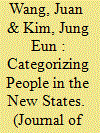

|
|
|
|
|
| Summary/Abstract |
What motivates states’ choice of social classification? Existing explanations highlight scientific beliefs of modern states or social engineering by ideological regimes. Focusing on the initial state-building period of two Communist regimes, China and North Korea, this article complements the existing literature and suggests that social classification reflects three missions of political leaders: regime distinction, governance, and power consolidation. Population categories are created to distinguish the new government from the old, to selectively provide welfare, and to attack political opponents. The varying weight of the missions and their manifestation in social classification depend on new ruling elites’ cohesion and past experiences. This comparative historical analysis sheds light on the rise of political chaos in China and the personalistic dictatorship in North Korea in the 1970s.
|
|
|
|
|
|
|
|
|
|
|
|
|
|
|
|
| 4 |
ID:
144990
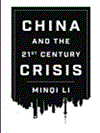

|
|
|
|
|
| Publication |
London, Pluto Press, 2016.
|
| Description |
221p.pbk
|
| Standard Number |
9780745335384
|
|
|
|
|
|
|
|
|
|
|
|
Copies: C:1/I:0,R:0,Q:0
Circulation
| Accession# | Call# | Current Location | Status | Policy | Location |
| 058647 | 330.91051/MIN 058647 | Main | On Shelf | General | |
|
|
|
|
| 5 |
ID:
167047
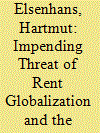

|
|
|
|
|
| Summary/Abstract |
It is wrong that globalization necessarily leads to a world system where all participating economies are capitalist economies. Under the prevailing conditions of disempowerment of labour, capitalism is too weak to transform rent-based underdeveloped economies. Globalization is driven by currency devaluation, which transforms new comparative advantage into cost competitiveness. The major check on devaluation is full employment. It is often not achieved in countries engaging in devaluation-driven exports. In order to globalize capitalism, labour in the South would have to be empowered. At the theoretical level, a neoliberal understanding of capitalism as against Keynesianism blocks an understanding of the importance of mass consumption for maintaining capitalism. At the political level, mass movements where they exist in the South are captured by secular nationalism or cultural nationalism. An increasingly fragmented multipolar system emerges where governments promote rent seeking.
|
|
|
|
|
|
|
|
|
|
|
|
|
|
|
|
| 6 |
ID:
140941
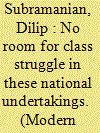

|
|
|
|
|
| Summary/Abstract |
Independent India's new state-owned infrastructural industries were not only entrusted with the mission of producing essential public commodities, but they were also required to promote the economic and social advancement of their workforces. To achieve this objective, big public enterprises in particular, helped by the financial power they derived from their control over the strategic sectors of the domestic economy, established generously endowed welfare programmes. This article argues that such a developmental ideology shaping managerial policy orientations is central to understanding why accepted explanations for the rationale of employer-sponsored social benefits are insufficient when it comes to studying similar initiatives in the Indian public sector. To substantiate its argument, the article explores the provisioning of social needs over a period of roughly half a century (1948–2002) at a large state-run producer of telecommunications equipment, Indian Telephone Industries. The welfare regime as it evolved here boasted one unique feature: it rested on dual foundations, with both the company and the trade union assuming independent responsibility for the well-being of employees. A range of informal self-help schemes devised by workers further supplemented the institutionalized social security net set up by the management and the union. The article also discusses how the firm sought to scale back its largesse in the aftermath of economic liberalization.
|
|
|
|
|
|
|
|
|
|
|
|
|
|
|
|
| 7 |
ID:
126014
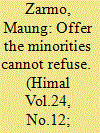

|
|
|
|
|
| Publication |
2011.
|
| Summary/Abstract |
In his Manifesto of the Communist Party (1848), Karl Marx wrote: 'The history of all hitherto existing society is the history of class struggles.' Such an assessment is only half-right when it comes to Burma's internal conflicts, of which ethnicity is of equal importance to class. Whether ethnicity is largely a matter of 'political choice', as many academics suggest today, has little relevance in the lives of these ethnic peoples. The Karen, Kachin, Mon, Shan, Karenni and others have chosen to hold on to their AK-47s or M16s in order to fight on. The unappealing alternative is surrender and subjugation at the feet of their uncompromising enemy in Rangoon and, since 2005, Naypyidaw.
|
|
|
|
|
|
|
|
|
|
|
|
|
|
|
|
|
|
|
|
|